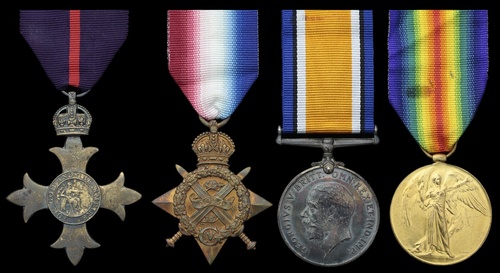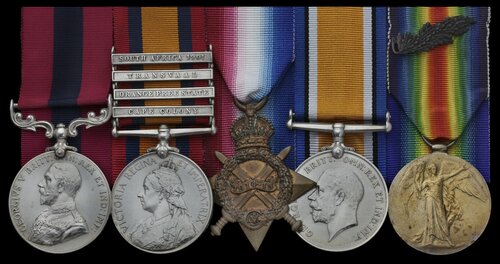A most unusual Great War campaign service group of six awarded to Captain W. P. Townshend, Royal Naval Reserve, a recipient of the Russian Order of St. Anne and the Greek Navy Medal, the latter for his services as Master of the Empress of India in a gallant Bay of Biscay rescue in 1930 1914-15 Star (Lieut., R.N.R.); British War and Victory Medals, M.I.D. oak leaf (Lt. Commr., R.N.R.); Royal Naval Reserve Decoration, G.V.R., silver, silver-gilt, hallmarks for London 1920; Russian Order of St. Anne, 2nd class neck badge, 43mm. x 43mm., gold and enamel, ‘56’ gold mark for St. Petersburg on eyelet; Greek Navy Medal, Republican issue, silver, the reverse engraved, ‘W. P. Townshend, 1932’, generally good very fine (6) £1200-1500 Footnote William Pearson Townshend, who was born in London in June 1875, qualified for his Certificate of Competency in 1903 and was enrolled in the Royal Naval Reserve in the rank of Lieutenant in December 1907. Earlier, in January 1900, as a Third Officer in the P. & O’s S.S. Assaye, he won the Royal Humane Society’s Medal in bronze for attempting to save the life of a Private in the Hampshire Regiment who had fallen overboard in Cape Town harbour - but he was not entitled to the Transport Medal. Having been based ashore at the outbreak of hostilities in August 1914, his first wartime seagoing appointment was in the cruiser H.M.S. Edgar, from June 1915 to May 1916, when he removed to the Queen Victoria, but not before witnessing active service in the Dardanelles. He subsequently commanded the Queen Victoria until the end of the War, gaining a mention in despatches in the Aegean for the period July to November 1918 (London Gazette 23 April 1919 refers). The recommendation states: ‘He has rendered most valuable services as Senior Officer Net-Layers and Net-Repair Vessels and has carried out his work of net-laying and net-repairing with great skill and ability.’ In June 1919, Townshend was assigned to special duties, and served as an Assistant Captain of Port / Harbour Master for six weeks at Constantinople, work that resulted in him receiving a favourable endorsement on his service record that August. He was awarded the Russian Order of St. Anne on 23 November 1920 (his service record refers) and received advancement to Commander in the following month. Placed on the Retired List in June 1922, he returned to his pre-war duties as a Master in the P. & O. Line, and won further accolades - namely the Greek Navy Medal - while in command of the Empress of India 1930-31: ‘As regards the rescue of the greater part of the crew of the Greek steamer Theodoros Bulgaria in the Bay of Biscay by the Viceroy of India, under the command of Captain W. P. Townshend, the Greek Minister in London, in replying to a letter from the Guild, requests the Secretary convey to the Captain, and through him to those members of the crew who took part in the rescue work, an expression of his great appreciation of their ‘courageous and gallant action’ on this occasion. It will be remembered that the Viceroy of India picked up the S.O.S. of the Greek steamer and at once proceeded at full speed towards the position indicated. After eight hours of hard steaming through heavy seas, the liner reached the stricken ship. Captain Townshend deemed it advisable to use oil to break the force of the seas, and a lifeboat was eventually launched from the Viceroy of India under the command of the Third Officer, Mr. C. S. Cook. The distressed vessel was lying low in the water with a list of about 40 degrees, and with the sea sweeping over her. It was only with the greatest difficulty that 19 men were eventually hauled through the seas to the boat by means of a lifeline, and ultimately the remaining 13 men on board succeeded in lowering one of their lifeboats and safely reached the Viceroy of India (Lloyd’s List, 12 January 1931 refers). Townshend, who had been advanced to Captain, R.N.R. on the Retired List in December 1925, died in March 1949.
A most unusual Great War campaign service group of six awarded to Captain W. P. Townshend, Royal Naval Reserve, a recipient of the Russian Order of St. Anne and the Greek Navy Medal, the latter for his services as Master of the Empress of India in a gallant Bay of Biscay rescue in 1930 1914-15 Star (Lieut., R.N.R.); British War and Victory Medals, M.I.D. oak leaf (Lt. Commr., R.N.R.); Royal Naval Reserve Decoration, G.V.R., silver, silver-gilt, hallmarks for London 1920; Russian Order of St. Anne, 2nd class neck badge, 43mm. x 43mm., gold and enamel, ‘56’ gold mark for St. Petersburg on eyelet; Greek Navy Medal, Republican issue, silver, the reverse engraved, ‘W. P. Townshend, 1932’, generally good very fine (6) £1200-1500 Footnote William Pearson Townshend, who was born in London in June 1875, qualified for his Certificate of Competency in 1903 and was enrolled in the Royal Naval Reserve in the rank of Lieutenant in December 1907. Earlier, in January 1900, as a Third Officer in the P. & O’s S.S. Assaye, he won the Royal Humane Society’s Medal in bronze for attempting to save the life of a Private in the Hampshire Regiment who had fallen overboard in Cape Town harbour - but he was not entitled to the Transport Medal. Having been based ashore at the outbreak of hostilities in August 1914, his first wartime seagoing appointment was in the cruiser H.M.S. Edgar, from June 1915 to May 1916, when he removed to the Queen Victoria, but not before witnessing active service in the Dardanelles. He subsequently commanded the Queen Victoria until the end of the War, gaining a mention in despatches in the Aegean for the period July to November 1918 (London Gazette 23 April 1919 refers). The recommendation states: ‘He has rendered most valuable services as Senior Officer Net-Layers and Net-Repair Vessels and has carried out his work of net-laying and net-repairing with great skill and ability.’ In June 1919, Townshend was assigned to special duties, and served as an Assistant Captain of Port / Harbour Master for six weeks at Constantinople, work that resulted in him receiving a favourable endorsement on his service record that August. He was awarded the Russian Order of St. Anne on 23 November 1920 (his service record refers) and received advancement to Commander in the following month. Placed on the Retired List in June 1922, he returned to his pre-war duties as a Master in the P. & O. Line, and won further accolades - namely the Greek Navy Medal - while in command of the Empress of India 1930-31: ‘As regards the rescue of the greater part of the crew of the Greek steamer Theodoros Bulgaria in the Bay of Biscay by the Viceroy of India, under the command of Captain W. P. Townshend, the Greek Minister in London, in replying to a letter from the Guild, requests the Secretary convey to the Captain, and through him to those members of the crew who took part in the rescue work, an expression of his great appreciation of their ‘courageous and gallant action’ on this occasion. It will be remembered that the Viceroy of India picked up the S.O.S. of the Greek steamer and at once proceeded at full speed towards the position indicated. After eight hours of hard steaming through heavy seas, the liner reached the stricken ship. Captain Townshend deemed it advisable to use oil to break the force of the seas, and a lifeboat was eventually launched from the Viceroy of India under the command of the Third Officer, Mr. C. S. Cook. The distressed vessel was lying low in the water with a list of about 40 degrees, and with the sea sweeping over her. It was only with the greatest difficulty that 19 men were eventually hauled through the seas to the boat by means of a lifeline, and ultimately the remaining 13 men on board succeeded in lowering one of their lifeboats and safely reached the Viceroy of India (Lloyd’s List, 12 January 1931 refers). Townshend, who had been advanced to Captain, R.N.R. on the Retired List in December 1925, died in March 1949.








/121623/Internet%20Image%201.jpg)
/76103/Internet%20Image%201.jpg)
/69253/Internet%20Image%201.jpg)




Try LotSearch and its premium features for 7 days - without any costs!
Be notified automatically about new items in upcoming auctions.
Create an alert